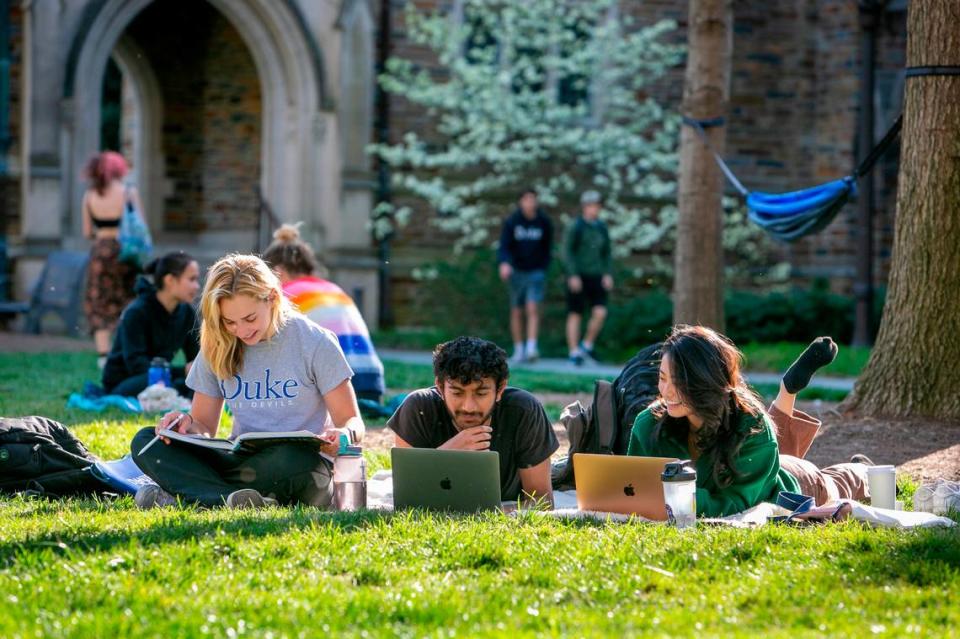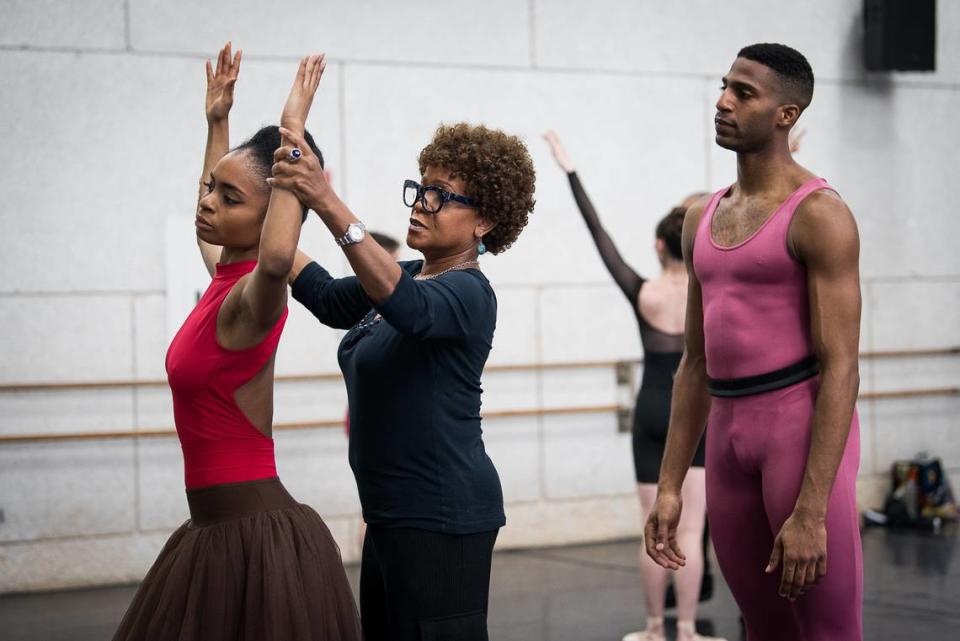Dean’s List: UNC has yet to offer financial aid due to FAFSA woes, leader tells Congress
In a normal year, students admitted to UNC-Chapel Hill are notified of any financial aid they would receive at the same time they receive their acceptance letter.
That’s not the case this year, UNC Vice Provost for Enrollment Rachelle Feldman testified Wednesday to the U.S. House of Representatives Committee on Education and the Workforce.
Though the university has notified students of their admissions decisions — with early applicants receiving their letters in January, and the remainder in March — UNC has yet to offer any students financial aid.
Why the delay? Look no further than the much-delayed Free Application for Federal Student Aid, or the FAFSA, which has been mired with glitches and other issues this applications cycle as the U.S. Department of Education rolled out a new version of the form.
“We have yet to be able to send out a single aid offer because of the poor quality of the data and the late receipt of [student records],” Feldman told committee members.
Feldman said she’s hopeful “some workarounds” will allow her office to make offers soon. But she expressed worries about how the botched FAFSA rollout would affect some students’ ability to attend college and their choice.
Welcome to Dean’s List, a weekly roundup of higher education news in the Triangle and across North Carolina from The News & Observer and myself, Korie Dean.
This week’s edition includes more key moments from Feldman’s testimony, as well as a decision by Duke University to end a scholarship for Black students and a new partnership for the UNC School of the Arts.
UNC vice provost testifies about FAFSA woes
The new FAFSA, which debuted months late in December, is intended to be easier and simpler to fill out for students and their families. But after glitches and more delays, the new form has been a significant point of frustration for both students and colleges and has put the U.S. Department of Education in the hot seat for its handling of the rollout.
Feldman was one of four experts to testify to House committee members on the FAFSA issues last week. The others were: Justin Draeger, president of the National Association of Student Financial Aid Administrators; Mark Kantrowitz, a national financial aid expert; and Kim Cook, CEO of the National College Attainment Network.
In the committee hearing, which lasted more than two hours last Wednesday, Feldman and the other experts fielded questions from lawmakers about the rollout and its impacts on students, their families and university staff, among other issues.
Feldman said those who are most impacted by the issues are “the students who need the money to go to college.”
“And it also impacts the most the students with the least experience with college-going — so, first-generation students, children of immigrants, populations that may have been told all their life that college wasn’t for them,” Feldman said. “They’ve worked very hard, and now they honestly don’t know whether they can afford it.”
Later, asked by Democratic Rep. Alma Adams of North Carolina about the long-term impacts of the FAFSA issues on student enrollment and “general institutional stability,” Feldman said she is worried that the university “will lose the lowest income, high-talent students” who may “choose not to enroll in college, and that will be bad for the entire economic and social mobility of our state.” Feldman added that the university may not be able to accurately predict or understand the makeup of its incoming class or the services students might need when they arrive to campus.
UNC-Chapel Hill is one of several universities in the public UNC System that have delayed the date by which admitted students must declare their enrollment, citing the issues with FAFSA and their impact on the university’s ability to offer students financial aid. Instead of May 1, students now have until May 15 to accept their offer of admission.
Feldman said the delays have made the cost of college “less clear” because “there’s no information to make a decision with.”
Feldman said her office is “hopeful that we have found some workarounds” to be able to “produce aid offers in a couple of weeks,” or by early May. One of those workarounds includes using the CSS Profile, a separate application for financial aid run by the College Board, the organization that also runs the SAT and Advanced Placement (AP) courses.
Feldman previously told The N&O — and reiterated to the committee — that UNC is trepidatious about offering financial aid based only on the CSS Profile because, as a public university, it wants to use the funds accurately, awarding aid with the full picture of a student’s aid in mind.
Even after UNC and other schools make their financial aid offers — with or without information from the FAFSA —some worry that the delays and glitches could linger. Asked by North Carolina Republican Rep. Virginia Foxx whether she believed the 2024-2025 FAFSA process would be smoother than this year’s, Feldman said she was hopeful, but also expressed doubt.
“I hope it will be a lot smoother, but it’s hard to know, and I don’t anticipate, right now, that it feels likely we’ll be ready in October, the usual date [the form opens],” Feldman said.
Duke ending scholarship for Black students
Duke University will discontinue the Reginaldo Howard Memorial Scholarship Program, a full-ride scholarship for the university’s “top applicants of African descent,” The Duke Chronicle reported last week.
The move comes nearly a year after the U.S. Supreme Court ruled the consideration of race in admissions unconstitutional in a landmark case involving UNC-Chapel Hill. That ruling explicitly applied only to admissions, but legal experts have warned that it could have wider implications, potentially impacting financial aid, scholarships and other programs, Inside Higher Ed reported.
Named for Duke’s first Black student government president, the scholarship was awarded to students based on both merit and a demonstration of financial aid. The scholarship’s webpage lists 17 current scholars; those students will continue to receive their scholarships as the program transitions to a new model that does not consider race.
“Although new merit scholarships for the Reginaldo Howard Memorial Scholarship will not be awarded, philanthropic support previously allocated for this program will go toward supporting current Reggie Scholars through their graduation, the new Reginaldo Howard Leadership Program, and need-based financial aid,” the program’s webpage states. “The new program will be open to all Duke undergraduates and will not include a competitive selection process as was required for the previous scholarship program.”
The new leadership program will aim to “continue inspiring and supporting Black undergraduate students in becoming engaged, confident, and connected leaders in the Duke community and beyond,” the webpage states, noting that further details are forthcoming.

UNCSA partners with Dance Theatre of Harlem
A new partnership between the UNC School of the Arts and a renowned ballet company, announced last week, will allow students to learn from and work closely with world-class performers.
UNCSA will partner with the Dance Theatre of Harlem, the storied ballet company known for its commitment to diversity and outreach, for a multi-year collaboration. Through the partnership, UNCSA student dancers will train in New York with dancers from the company, and the company’s dancers will also visit the UNCSA campus in Winston-Salem for instruction and performances.
The partnership will also bring iconic works from the Dance Theatre’s repertoire to venues throughout North Carolina, starting with performances of “Firebird” in High Point later this month, April 25-27 — marking the first time the company has performed the ballet since 2004. Company artists will dance the lead roles on opening night alongside UNCSA student dancers, with student dancers reprising those roles on subsequent performances. The performances will also include music by the UNCSA Symphony Orchestra, lighting by the UNCSA School of Design & Production and costumes by the UNCSA Dance Costume Shop.
Eventually, “Firebird” will return to Dance Theatre of Harlem’s repertoire in future seasons, with UNCSA student dancers performing as guests in the corps de ballet at select engagements.
The partnership is supported by the Thomas S. Kenan Institute for the Arts in Winston-Salem and “is part of a larger effort to expand and evolve industry partnerships for UNCSA.”
UNCSA School of Dance Dean Endalyn Outlaw was formerly director of Dance Theatre of Harlem School and a principal dancer with the company.
“This partnership with Dance Theatre of Harlem exemplifies our commitment to providing our students with unparalleled opportunities for artistic growth and professional development,” UNCSA Chancellor Brian Cole said in a news release. “By collaborating with one of the world’s most esteemed dance companies, with a proven mission of educating the next generation of diverse artists, we are ensuring that our students receive training at the highest level, further positioning them for success in their careers.”
Tickets for performances of “Firebird” at High Point Theatre can be purchased at uncsa.edu/performances or by calling the box office at 336-721-1945.

Higher ed news I’m reading
As campus protests and student activism on the Israel-Hamas war continue nationwide, some colleges and universities are cracking down on demonstrators by issuing suspensions, expulsions or other punishments, Inside Higher Ed reports.
UNC-Chapel Hill law students are petitioning Chancellor Lee Roberts to allow their classmate Jamie Marsicano to walk with them at their upcoming graduation, The Daily Tar Heel reports. Marsicano was banned from the UNC campus last year after being charged with domestic terrorism in connection with protesting the Atlanta Public Safety Training Center, commonly known as “Cop City,” and has been finishing their degree at Duke.
Some public universities in North Carolina stalled for months when asked to release public records related to sexual assaults, an investigation by Technician, NC State’s student paper, found.
Sign up for our higher education newsletter
That’s all for this week’s roundup of North Carolina higher education news. I hope you’ll stay tuned for more.
Like what you read here and want to be on our mailing list when the Dean’s List newsletter launches? Have suggestions for what kind of content you’d like to see featured in the future? Let us know by filling out the form below:

